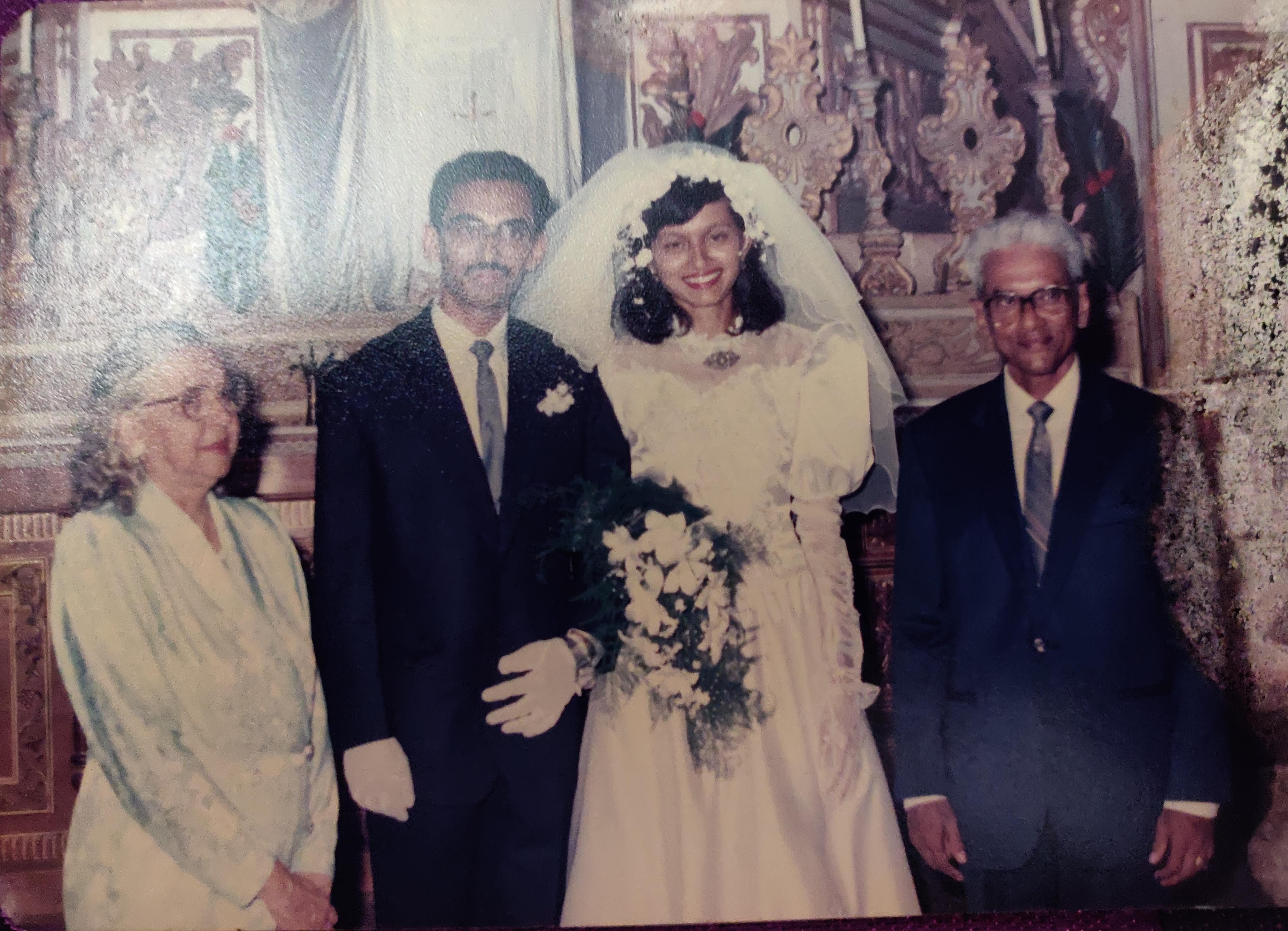Papa - 1
Fernando do Carmo Heitor de Noronha, filho primogénito de Tomaz Nuno Francisco Carmo de Noronha, de Neurá-o-Grande, e Leonor Zoraide do Rosário e Sousa, de Aldonã, nasceu em casa dos avós maternos. Casado com Judite Teresa da Veiga, de Curtorim, tinha o Curso Complementar dos Liceus (de Letras e de Ciências).
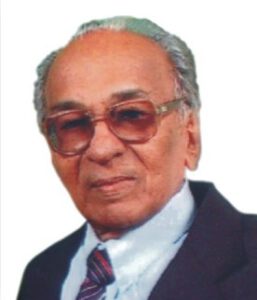
Funcionário público (do Quadro da Administração Civil e, mais tarde, do da Polícia Judiciária), depois de aposentado, nos anos 70, esteve ligado a O Heraldo, o último diário da língua portuguesa em Goa, fundando depois, com outros, em 1983, o semanário A Voz de Goa, que veio a ser o último periódico expresso no idioma luso. Dedicado à língua portuguesa, entre os anos 1985-88, foi professor-convidado de Português no Xavier Centre of Historical Research (Miramar/Porvorim) e no Dhempe College of Arts & Science, Miramar.
Em 2002, publicou o seu primeiro livro, Momentos do meu Passado, sob a chancela da casa editora Third Millennium, fundada pela família e de que era parceiro, sendo talvez a única casa a publicar livros em português nesta parte do mundo. Um segundo volume de memórias – Goa tal como a conheci – será lançado dentro de meses. E ainda tem vários inéditos.
Era pai/sogro de Óscar/Isabel, Ilídio/Imelda, Ivo/Tânia, Sávio/Olívia e Orlando/Tina, e avô de quinze netos (7 rapazes e 8 raparigas).
(Apontamentos prestados à Revista Ecos do Oriente, de Loures, Portugal, cujo director, Mário Cirilo Viegas, publicou, com acrescentamentos que não estão integrados no presente texto, sob o título de ‘Fernando de Noronha: Um Indo-Português de Caráter’, na edição de Jul-Set de 2011 (Ano VI, N.º 23), com capa e editorial dedicados a meu Pai)
Magic Aunt Zita

When our best-loved aunt Zita left for her heavenly abode a year ago, we felt a light going out of our lives. There was darkness everywhere. She had been struck by a crippling illness for a considerable period, but magically, her own light never flickered; on the contrary, by her exemplary fortitude, she radiated still more light. I got the picture when I spent a day by her side, at her home in Curtorim, to recall the good old times and to especially thank her for all that she meant to us. In her last months, kith and kin she had not seen in a long time also had the fortune of meeting up with her.
Tia Zita spelt magic, in the positive sense of the term. She was cheery – that’s magic; she loved unconditionally – and that’s magic, too. What else could one wish for? You ask, what is the secret of all this? Her very life – lived less for self and more for others. Her unspoken motto was ‘Fazer o bem, sem ver a quem’: Doing good to all and sundry. At times she must have felt misunderstood, but she took it all in her stride, convinced that loving kindness conquers all!
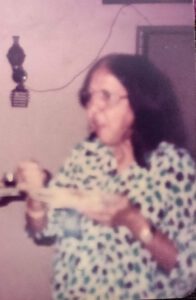
St Paul exhorted the New Christians to be, ‘like Christ, everything to everybody’. To some our aunt was the Sun, to others the Moon. She burnt strong and bright as the sun, and stood by her family like a rock; and like the moon, her soft side provided a cushion to the family’s generation-next in their difficult moments. She would make light of any problem and top it off with a delectable treat!
With that perfect balance she managed home and office. Her husband experienced her self-giving love for more than quarter of a century; colleagues at office and staff at home valued her understanding and jovial disposition. She generously gave of her time, especially to her mother, and of her money to those in need. Her easy smile would turn into peals of laughter, triggered by an upfront comment or some naïveté of yesteryear. With no children of her own, she was a mother to her nephews and nieces. It was in her nature to reach out to everyone, which won her the epithet ‘Mother of Mercy’!
She was a woman ahead of her times. She studied and worked in British India and then joined the state tourism and information bureau in the Goan capital. In the early 1970s – when hardly any lady in Goa dreamed of owning a two-wheeled motor vehicle – she would ride her Rajdoot scooter to her workplace in Margão. This spoke of her outgoing personality, her initiative, and of her daring, too, especially considering that she could neither start the bike nor park it securely: a man-servant at home and a peon at the office usually did the honours!
As the first manager of the government-owned tourist cottages in Farmagudi, she once played host to our bachelor statesman Vajpayee, then a foreign minister. He praised her penchant for landscaping, while our aunt quite naturally engaged in repartee reflecting the Goan joie de vivre. All of which must have got our poet-minister to pen a verse or two!
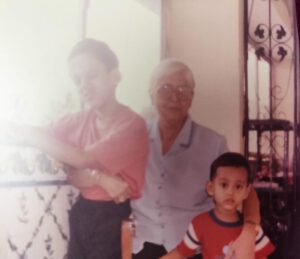
Aunt Zita herself was not an armchair tourist; impelled by the travel bug, that slim and fair-skinned lady, who was always in step with fashion, crisscrossed India and some countries in Europe, with a relative or a friend. And after having been a ‘tourist’ all her life, in the two decades of her retirement she was essentially a ‘pilgrim’ who daily went to church for Mass and was engaged in charitable activity.
Several years earlier, a critical tryst with illness, which she was healed of thanks to a non-surgical intervention by the saintly Dr Ernest Borges, had been a turning point in her life. But her final test came during the Holy Week last year: she lay in the hospital bed – her purgatory on earth – her sweet visage reflecting Christian resignation vis-à-vis that inescapable moment of reckoning.
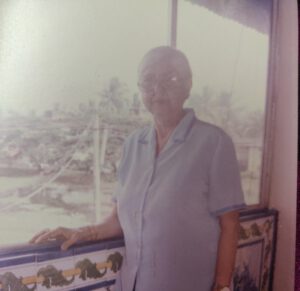
It is a moral certainty that Tia Zita is now in the Beatific Vision. And most certainly, too, none of what has been said here will be of importance to her; it rather will make us all the difference to realize that her life was an echo of this touching quote: ‘I shall pass through this world but once. Any good therefore that I can do or any kindness that I can show to any human being, let me do it now. Let me not defer it or neglect it, for I shall not pass this way again’ – which could well be a way for us – who are not of this world – to look forward to the treasure that awaits us in Heaven.
(Herald, 27 March 2009)
Banner pic: Isabel and I, flanked by T. Zita and T. Francisquinho, Neura, 13 May 1994
